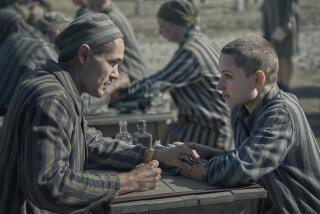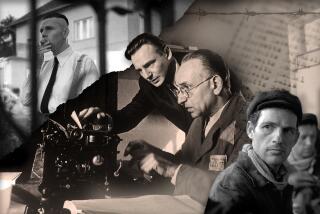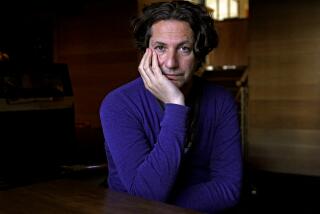Holocaust Casts Shadow on ‘Mendel’s’ Youth
The enormity of the evil of the Third Reich revealed in the cinema of the Holocaust over the decades has reflected, by and large nobly, the vast geographical scope and equally vast diversity of experiences endured by its survivors. The latest addition to this immense, ongoing cinematic tapestry is Alexander Rosler’s exquisitely expressed “Mendel,” a coming-of-age tale with unusual circumstances.
The place and time is rural Bavaria in 1954, where a German Jewish family is leaving to begin a new life in Norway as part of a government program to relocate a small number of Jews. Nine-year-old Mendel (Thomas Jungling Sorensen), whose family seems to have been living under the protection of kindly Herr Fischer, cannot understand why this is happening. “No Jew can stay in Germany after what they’ve done to us” is a constant refrain, but Mendel does not understand what this means. He is also constantly being told that there can be no explanations “until you’re older.”
You can certainly appreciate his loving, worn parents (Hans Kremer, Teresa Harder) wanting to protect their son from hearing about the horrors of the Holocaust until they feel he’s old enough to handle them. Yet Mendel, who is very bright and high-spirited, is naturally curious, growing up in an atmosphere of uncompleted sentences and veiled allusions. He is, of course, aware of World War II but does not understand the way in which his parents and older brother David (Martin Meingast) are different from other war survivors.
Yet inevitably the boy will not be stopped from piecing bits of information together, and one of the film’s key accomplishments is to evoke Mendel’s occasional troubled dreams, composed of images of Nazi acts of oppression he’s not supposed to have heard of, accounts of his parents’ suffering, and a jumble of Jewish and Christian figures and symbols. As you might expect, the move to Norway is severely dislocating, with his nonreligious family initially crowded into an old apartment with an Orthodox family--these scenes are eerily reminiscent of life in Anne Frank’s Secret Annex.
There are well-meaning Christians eager to convert Mendel’s family, and a schoolteacher dumbfounded by having a little Jewish boy in her class. (There’s clearly no separation of church and state here.) Amid so much contradiction and confusion, with his parents struggling to achieve their own equilibrium while inundated with horrifying memories, Mendel represents the eternal resiliency and adaptability of the young.
Rosler, a German Jew who emigrated to Norway as a child, misses no opportunity to find humor in Mendel’s growing up. However, he’s not entirely convincing when he depicts Mendel, once he learns the truth, as cursing Jews for having been, in his view, so passive in the face of the Nazis. You could wish, too, that Rosler could have let us know a little more about how Mendel’s family lived between the time he was born and the emigration to Norway. On the whole, however, “Mendel” is a distinctive, acutely sensitive film that is capably sustained by Sorensen, yet another of those amazing child actors who’ve been emerging in large numbers in recent years.
* Unrated. Times guidelines: The film deals with complex Holocaust themes.
‘Mendel’
Thomas Jungling Sorensen: Mendel
Teresa Harder: Bela
Hans Kremer: Aron
Martin Meingast: David
A First Run Features of a Northern Lights presentation in co-production with Zentropa Entertainments, Lichtblick Filmproduktion, Norsk Film and NRK. Writer-director Alexander Rosler. Producer Axel Helgeland. Cinematographer Helge Semb. Editor Einer Egeland. Music Geir Bohren and Bent Aserud. Production designer Jack Von Domburg. In German and Norwegian, with English subtitles. Running time: 1 hour, 38 minutes.
* Exclusively at the Grande 4-Plex through Thursday, 345 S. Figueroa St., downtown L.A., (213) 617-0268.
More to Read
Only good movies
Get the Indie Focus newsletter, Mark Olsen's weekly guide to the world of cinema.
You may occasionally receive promotional content from the Los Angeles Times.









